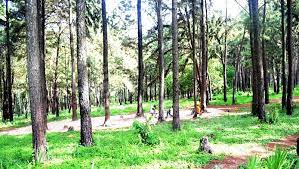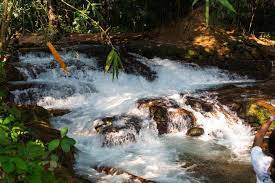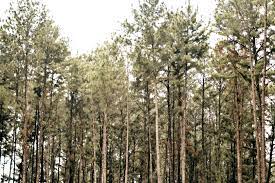Ngwo Pine Forest, located in Enugu State, Nigeria, is a picturesque natural sanctuary renowned for its dense pine trees,
serene ambiance, and captivating beauty. As one of Nigeria’s hidden gems, Ngwo Pine Forest offers visitors a tranquil escape from the hustle and bustle of urban life, inviting them to immerse themselves in the wonders of nature.
Click here to watch a video: https://www.facebook.com/tournigeriang/videos/an-epic-journey-into-ngwo-pine-forestenugu-nigeria/450809239560697/
A Glimpse
The Ngwo Pine Forest is a pine forest near the center of Enugu. It hosts a limestone cave sculpted by a small waterfall that forms a shallow pool at the bed of the cave. The Ngwo Pine Forest is used as a recreational area, most frequently as a picnic area. It has been a means of socio-economic development for Enugu State, Nigeria.
The Ngwo Pine Forest Formation (NPFF) is a patch of montane rainforest and cloud forest on the Ngwo Hills in southeast Nigeria. It is the southernmost extent of the Afromontane Forest ecoregion and is one of the most diverse forests in Africa.
In the early 20th century, the British colonial government established a forest reserve in the NPFF. This reserve was intended to protect the forest from deforestation and to ensure a sustainable supply of timber.
However, the forest reserve was not very effective at preventing deforestation In fact, the NPFF has lost a significant amount of forest cover over the last 50 years, due to agricultural expansion, logging, and mining.
Today, the NPFF is still a relatively intact forest, but is under threat from a number of factors, including deforestation, climate change, and invasive species.
The Ngwo Pine Forest has purposes such as hosting pilgrimages and educational activities. It also bolsters the tourism industry in Enugu State
The Forest beckons travelers with its lush greenery and refreshing air. The forest is home to a variety of indigenous plant species,
including towering pine trees that cast a soothing shade over the landscape. As you wander along the winding pathways,
you’ll be greeted by the gentle rustle of leaves and the melodic chirping of birds, creating a symphony of sounds that calms the
soul and rejuvenates the spirit.


An image of the Forest
Economic Activities
Agriculture plays a vital role in the economic sustenance of the area. The land surrounding the forest is often utilized for agricultural purposes. Local communities undertake cultivation, with a focus on crops like pineapples and other fruits. These agricultural activities serve as a means of livelihood for the residents.
Forestry also features prominently in the economic landscape of the Ngwo Pine Forest. Sustainable forest management practices are implemented, including timber harvesting, collection of non-timber forest products, and reforestation efforts. These practices aim to
strike a balance between economic needs and environmental conservation.
Furthermore, the local artisan community engages in the creation and sale of handcrafted products, utilizing materials sourced from the forest. This might encompass wood carvings and traditional handicrafts, thereby contributing to the local economy.
In addition to these activities, some residents participate in small-scale livestock farming, rearing animals such as goats, poultry,
or cows as part of their economic pursuits. One of the highlights of Ngwo Pine Forest is the enchanting waterfall that cascades
through the heart of the forest. Fed by crystal-clear streams that meander through the foliage, the waterfall plunges into a tranquil pool below, creating a mesmerizing spectacle of nature’s power and beauty. Visitors can take a refreshing dip in the cool waters or
simply bask in the serene ambiance while marveling at the sheer majesty of the falls.
Adventure and Exploration
For adventure enthusiasts, Ngwo Pine Forest offers a myriad of activities to satisfy your wanderlust. Embark on a scenic hike through the forest trails, where every twist and turn reveals a new vista of breathtaking beauty.
Thrill-seekers can test their courage by traversing the canopy walkway suspended high above the forest floor, offering panoramic views of the surrounding landscape.
Whether you’re an avid explorer or a casual nature lover, Ngwo Pine Forest promises an unforgettable adventure at every turn. Beyond its natural splendor, Ngwo Pine Forest is steeped in cultural heritage and local folklore.
Visitors can learn about the traditions and customs of the indigenous communities that have called this area home for generations, gaining insight into the rich tapestry of Nigerian culture. Guided tours and cultural experiences offer a glimpse into the lives of the people
who have lived in harmony with the forest for centuries, fostering a deeper appreciation for the interconnectedness of humanity and nature.
Climate
Ngwo Pine Forest has a tropical climate with distinct wet and dry seasons, categorized as Aw according to the Köppen-Geiger classification. Situated near the equator, the region encounters difficulty in defining its summers due to consistent warmth throughout the year.
The annual average temperature hovers around 25.9 °C | 78.6 °F, maintaining a relatively warm and consistent climate.[30]
The precipitation pattern reveals a notable seasonal variation, with summers being considerably rainier than winters. On an
annual basis, Ngwo Pine Forest records a total precipitation of 1719 mm | 67.7 inches. The month of January stands out as the driest, witnessing a mere 9 mm | 0.4 inches of rainfall. In contrast, September is the wettest month, experiencing an average precipitation of 270 mm | 10.6 inches.
Temperature fluctuations throughout the year range from a maximum of 34.5 °C | 94 °F in February to a minimum of 23.9 °C | 75 °F in August. This temperature variability is relatively modest, with an annual range of 4.5 °C | 8.0 °F.
Relative humidity follows a seasonal trend, with September having the highest humidity at 85.21%, while January records the lowest at 41.09%. July emerges as the month with the rainiest days, totaling 27.27 days, whereas December experiences the fewest rainy days, averaging only 1.53 days.
In Conclusion
As stewards of this precious natural resource, it is imperative to prioritize the conservation and sustainable management of
Ngwo Pine Forest. Efforts are underway to protect the forest ecosystem, preserve biodiversity, and promote responsible tourism
practices that minimize environmental impact. By supporting conservation initiatives and advocating for the preservation
of the Forest, visitors can help ensure that future generations can continue to enjoy and appreciate this extraordinary natural wonder for years to come.
Ngwo Pine Forest stands as a attestation to the beauty and resilience of Nigeria’s natural heritage, offering a sanctuary of tranquility
and wonder for all who venture within its embrace. Whether you seek adventure, relaxation, or cultural immersion, this enchanting
forest promises an unforgettable experience that will leave you captivated by the magic of nature.
Pack your sense of adventure and embark on a journey to Ngwo Pine Forest, where the wonders of the natural world await discovery.
Read More: https://placesandlifestyle.com/exploring-your-hometown-oyo-town/




